人教版(2019)选择性必修第一册Unit 1 People of Achievement单元重难点过关练(有答案)
文档属性
| 名称 | 人教版(2019)选择性必修第一册Unit 1 People of Achievement单元重难点过关练(有答案) | 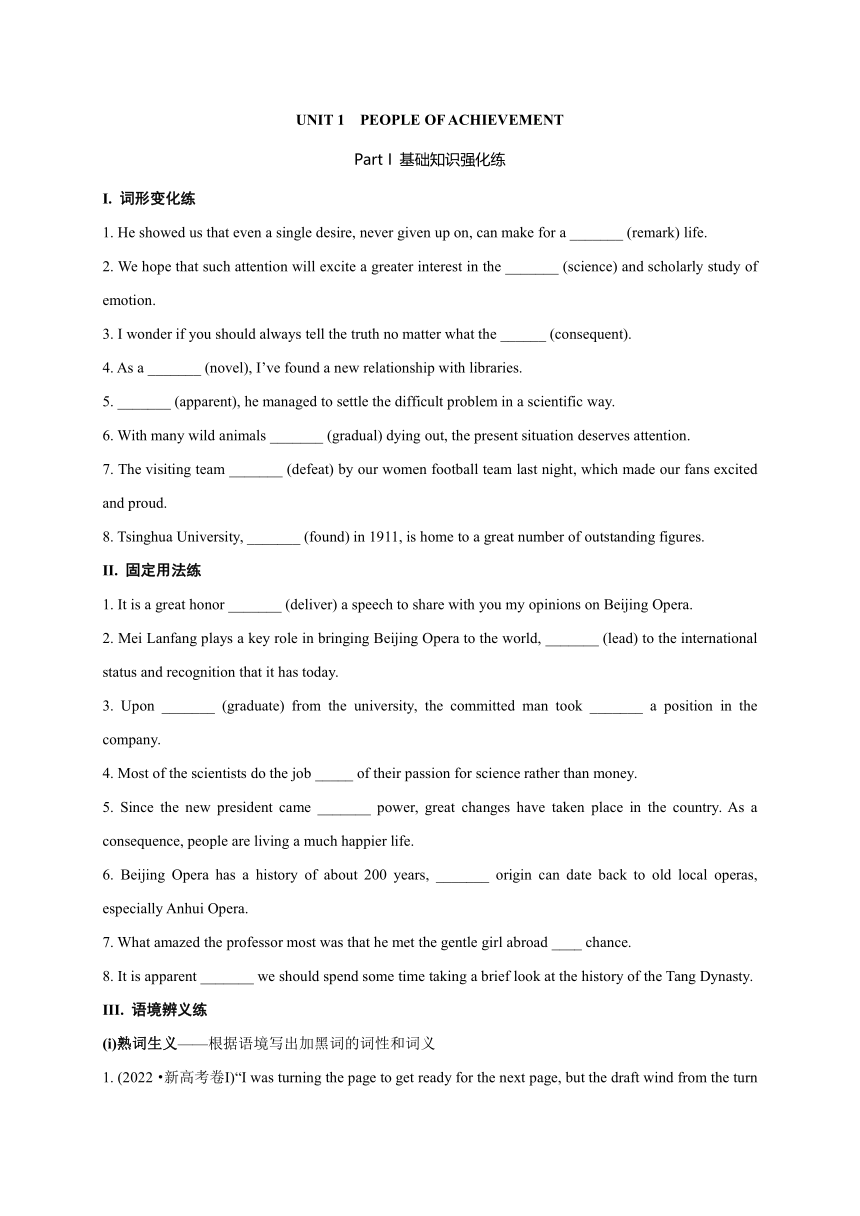 | |
| 格式 | docx | ||
| 文件大小 | 34.2KB | ||
| 资源类型 | 教案 | ||
| 版本资源 | 人教版(2019) | ||
| 科目 | 英语 | ||
| 更新时间 | 2022-12-20 10:20:05 | ||
图片预览

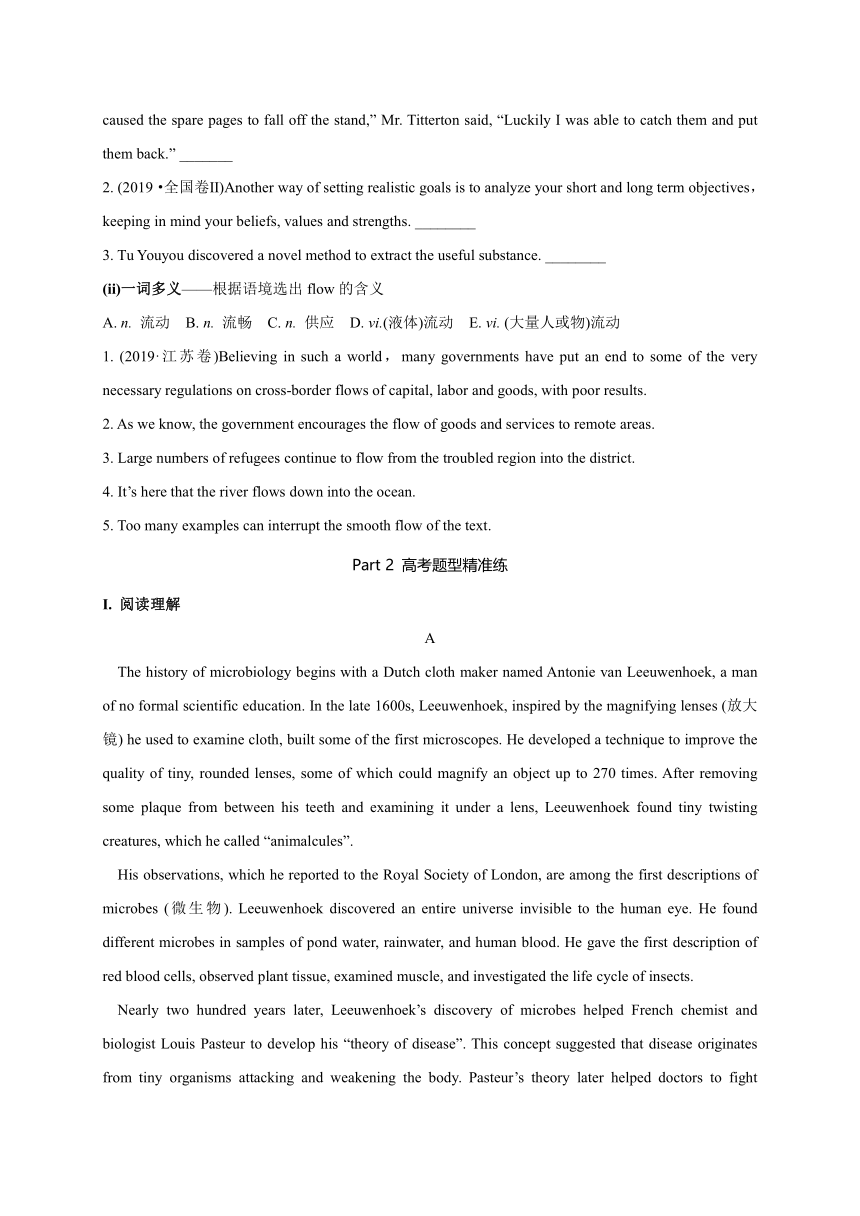
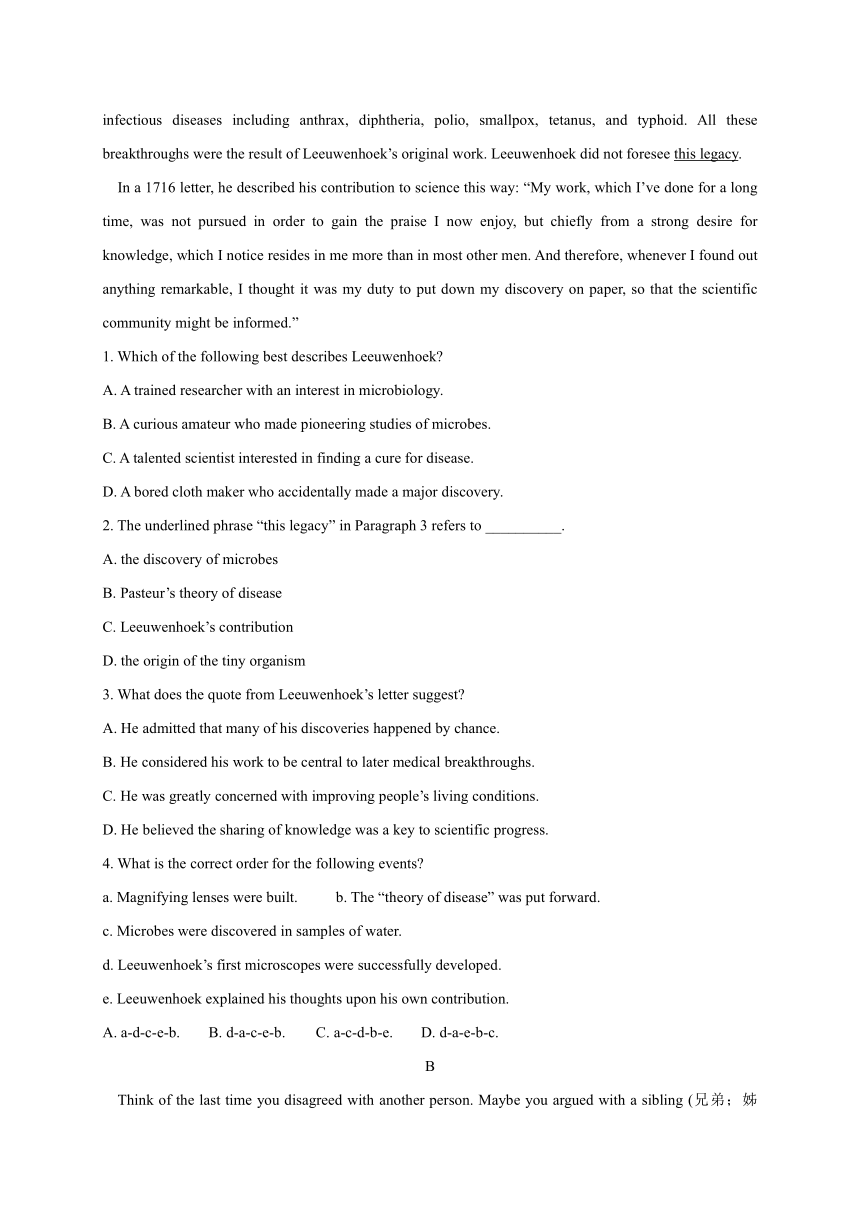
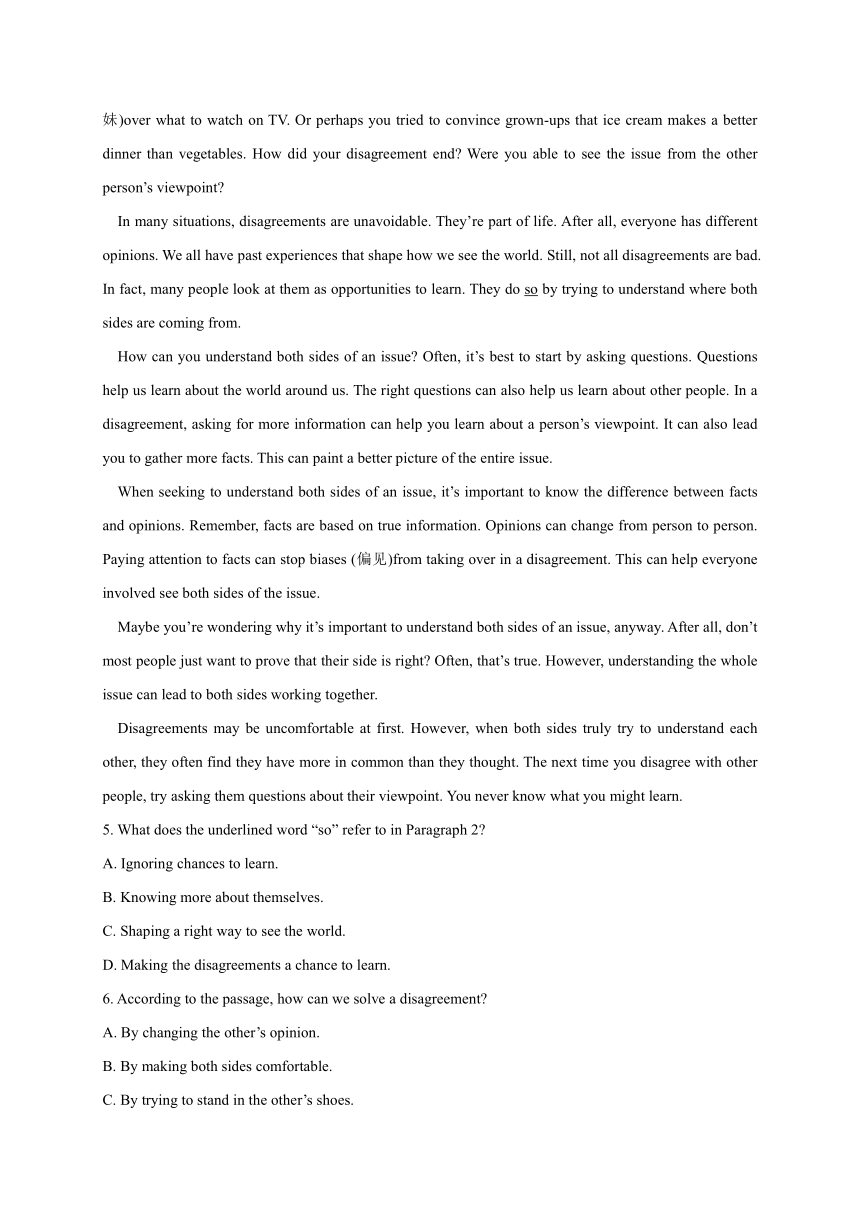
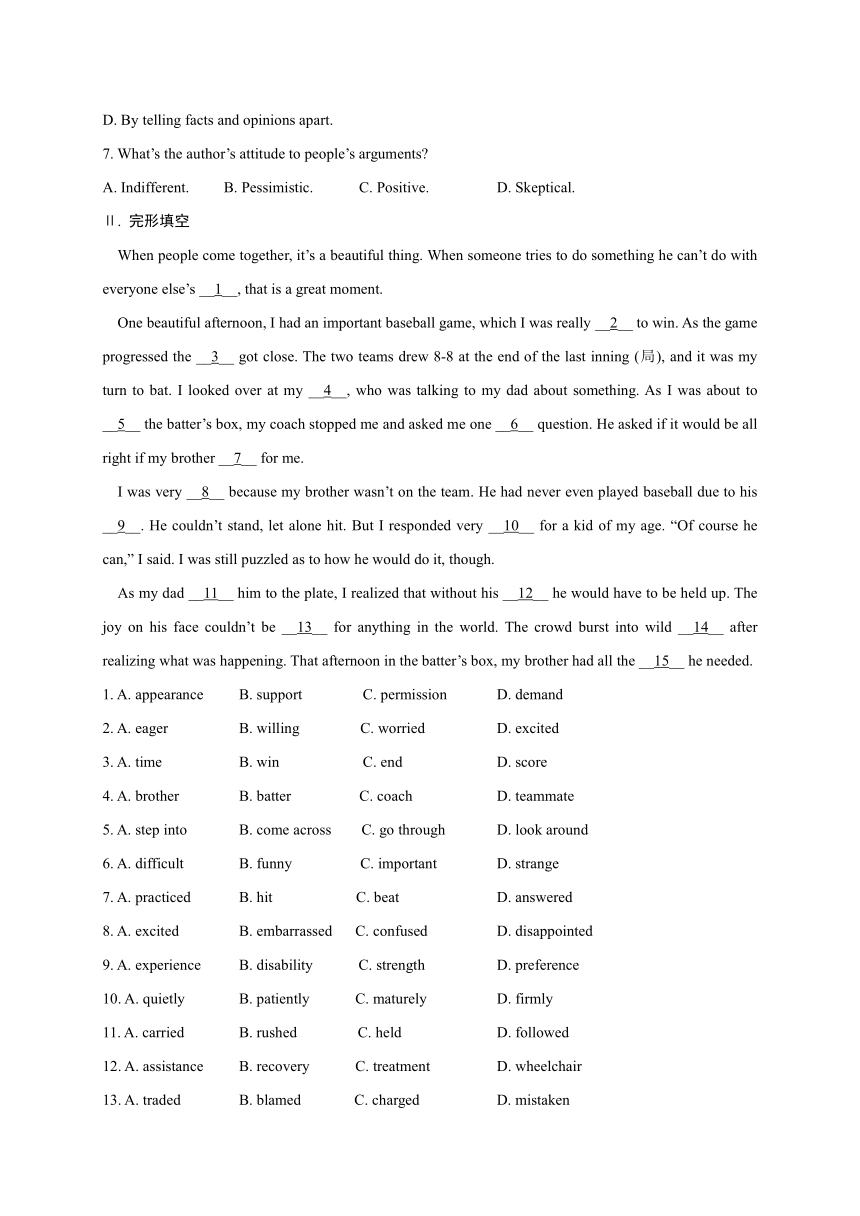
文档简介
UNIT 1 PEOPLE OF ACHIEVEMENT
Part I 基础知识强化练
I. 词形变化练
1. He showed us that even a single desire, never given up on, can make for a _______ (remark) life.
2. We hope that such attention will excite a greater interest in the _______ (science) and scholarly study of emotion.
3. I wonder if you should always tell the truth no matter what the ______ (consequent).
4. As a _______ (novel), I’ve found a new relationship with libraries.
5. _______ (apparent), he managed to settle the difficult problem in a scientific way.
6. With many wild animals _______ (gradual) dying out, the present situation deserves attention.
7. The visiting team _______ (defeat) by our women football team last night, which made our fans excited and proud.
8. Tsinghua University, _______ (found) in 1911, is home to a great number of outstanding figures.
II. 固定用法练
1. It is a great honor _______ (deliver) a speech to share with you my opinions on Beijing Opera.
2. Mei Lanfang plays a key role in bringing Beijing Opera to the world, _______ (lead) to the international status and recognition that it has today.
3. Upon _______ (graduate) from the university, the committed man took _______ a position in the company.
4. Most of the scientists do the job _____ of their passion for science rather than money.
5. Since the new president came _______ power, great changes have taken place in the country. As a consequence, people are living a much happier life.
6. Beijing Opera has a history of about 200 years, _______ origin can date back to old local operas, especially Anhui Opera.
7. What amazed the professor most was that he met the gentle girl abroad ____ chance.
8. It is apparent _______ we should spend some time taking a brief look at the history of the Tang Dynasty.
III. 语境辨义练
(i)熟词生义——根据语境写出加黑词的词性和词义
1. (2022·新高考卷Ⅰ)“I was turning the page to get ready for the next page, but the draft wind from the turn caused the spare pages to fall off the stand,” Mr. Titterton said, “Luckily I was able to catch them and put them back.” _______
2. (2019·全国卷Ⅱ)Another way of setting realistic goals is to analyze your short and long term objectives,keeping in mind your beliefs, values and strengths. ________
3. Tu Youyou discovered a novel method to extract the useful substance. ________
(ii)一词多义——根据语境选出flow的含义
A. n. 流动 B. n. 流畅 C. n. 供应 D. vi.(液体)流动 E. vi. (大量人或物)流动
1. (2019·江苏卷)Believing in such a world,many governments have put an end to some of the very necessary regulations on cross-border flows of capital, labor and goods, with poor results.
2. As we know, the government encourages the flow of goods and services to remote areas.
3. Large numbers of refugees continue to flow from the troubled region into the district.
4. It’s here that the river flows down into the ocean.
5. Too many examples can interrupt the smooth flow of the text.
Part 2 高考题型精准练
I. 阅读理解
A
The history of microbiology begins with a Dutch cloth maker named Antonie van Leeuwenhoek, a man of no formal scientific education. In the late 1600s, Leeuwenhoek, inspired by the magnifying lenses (放大镜) he used to examine cloth, built some of the first microscopes. He developed a technique to improve the quality of tiny, rounded lenses, some of which could magnify an object up to 270 times. After removing some plaque from between his teeth and examining it under a lens, Leeuwenhoek found tiny twisting creatures, which he called “animalcules”.
His observations, which he reported to the Royal Society of London, are among the first descriptions of microbes (微生物). Leeuwenhoek discovered an entire universe invisible to the human eye. He found different microbes in samples of pond water, rainwater, and human blood. He gave the first description of red blood cells, observed plant tissue, examined muscle, and investigated the life cycle of insects.
Nearly two hundred years later, Leeuwenhoek’s discovery of microbes helped French chemist and biologist Louis Pasteur to develop his “theory of disease”. This concept suggested that disease originates from tiny organisms attacking and weakening the body. Pasteur’s theory later helped doctors to fight infectious diseases including anthrax, diphtheria, polio, smallpox, tetanus, and typhoid. All these breakthroughs were the result of Leeuwenhoek’s original work. Leeuwenhoek did not foresee this legacy.
In a 1716 letter, he described his contribution to science this way: “My work, which I’ve done for a long time, was not pursued in order to gain the praise I now enjoy, but chiefly from a strong desire for knowledge, which I notice resides in me more than in most other men. And therefore, whenever I found out anything remarkable, I thought it was my duty to put down my discovery on paper, so that the scientific community might be informed.”
1. Which of the following best describes Leeuwenhoek
A. A trained researcher with an interest in microbiology.
B. A curious amateur who made pioneering studies of microbes.
C. A talented scientist interested in finding a cure for disease.
D. A bored cloth maker who accidentally made a major discovery.
2. The underlined phrase “this legacy” in Paragraph 3 refers to __________.
A. the discovery of microbes
B. Pasteur’s theory of disease
C. Leeuwenhoek’s contribution
D. the origin of the tiny organism
3. What does the quote from Leeuwenhoek’s letter suggest
A. He admitted that many of his discoveries happened by chance.
B. He considered his work to be central to later medical breakthroughs.
C. He was greatly concerned with improving people’s living conditions.
D. He believed the sharing of knowledge was a key to scientific progress.
4. What is the correct order for the following events
a. Magnifying lenses were built. b. The “theory of disease” was put forward.
c. Microbes were discovered in samples of water.
d. Leeuwenhoek’s first microscopes were successfully developed.
e. Leeuwenhoek explained his thoughts upon his own contribution.
A. a-d-c-e-b. B. d-a-c-e-b. C. a-c-d-b-e. D. d-a-e-b-c.
B
Think of the last time you disagreed with another person. Maybe you argued with a sibling (兄弟;姊妹)over what to watch on TV. Or perhaps you tried to convince grown-ups that ice cream makes a better dinner than vegetables. How did your disagreement end Were you able to see the issue from the other person’s viewpoint
In many situations, disagreements are unavoidable. They’re part of life. After all, everyone has different opinions. We all have past experiences that shape how we see the world. Still, not all disagreements are bad. In fact, many people look at them as opportunities to learn. They do so by trying to understand where both sides are coming from.
How can you understand both sides of an issue Often, it’s best to start by asking questions. Questions help us learn about the world around us. The right questions can also help us learn about other people. In a disagreement, asking for more information can help you learn about a person’s viewpoint. It can also lead you to gather more facts. This can paint a better picture of the entire issue.
When seeking to understand both sides of an issue, it’s important to know the difference between facts and opinions. Remember, facts are based on true information. Opinions can change from person to person. Paying attention to facts can stop biases (偏见)from taking over in a disagreement. This can help everyone involved see both sides of the issue.
Maybe you’re wondering why it’s important to understand both sides of an issue, anyway. After all, don’t most people just want to prove that their side is right Often, that’s true. However, understanding the whole issue can lead to both sides working together.
Disagreements may be uncomfortable at first. However, when both sides truly try to understand each other, they often find they have more in common than they thought. The next time you disagree with other people, try asking them questions about their viewpoint. You never know what you might learn.
5. What does the underlined word “so” refer to in Paragraph 2
A. Ignoring chances to learn.
B. Knowing more about themselves.
C. Shaping a right way to see the world.
D. Making the disagreements a chance to learn.
6. According to the passage, how can we solve a disagreement
A. By changing the other’s opinion.
B. By making both sides comfortable.
C. By trying to stand in the other’s shoes.
D. By telling facts and opinions apart.
7. What’s the author’s attitude to people’s arguments
A. Indifferent. B. Pessimistic. C. Positive. D. Skeptical.
Ⅱ. 完形填空
When people come together, it’s a beautiful thing. When someone tries to do something he can’t do with everyone else’s __1__, that is a great moment.
One beautiful afternoon, I had an important baseball game, which I was really __2__ to win. As the game progressed the __3__ got close. The two teams drew 8-8 at the end of the last inning (局), and it was my turn to bat. I looked over at my __4__, who was talking to my dad about something. As I was about to __5__ the batter’s box, my coach stopped me and asked me one __6__ question. He asked if it would be all right if my brother __7__ for me.
I was very __8__ because my brother wasn’t on the team. He had never even played baseball due to his __9__. He couldn’t stand, let alone hit. But I responded very __10__ for a kid of my age. “Of course he can,” I said. I was still puzzled as to how he would do it, though.
As my dad __11__ him to the plate, I realized that without his __12__ he would have to be held up. The joy on his face couldn’t be __13__ for anything in the world. The crowd burst into wild __14__ after realizing what was happening. That afternoon in the batter’s box, my brother had all the __15__ he needed.
1. A. appearance B. support C. permission D. demand
2. A. eager B. willing C. worried D. excited
3. A. time B. win C. end D. score
4. A. brother B. batter C. coach D. teammate
5. A. step into B. come across C. go through D. look around
6. A. difficult B. funny C. important D. strange
7. A. practiced B. hit C. beat D. answered
8. A. excited B. embarrassed C. confused D. disappointed
9. A. experience B. disability C. strength D. preference
10. A. quietly B. patiently C. maturely D. firmly
11. A. carried B. rushed C. held D. followed
12. A. assistance B. recovery C. treatment D. wheelchair
13. A. traded B. blamed C. charged D. mistaken
14. A. tears B. cheers C. laughter D. anger
15. A. consideration B. appreciation C. reward D. happiness
Ⅲ. 语法填空
Born in China in 1911, Qian Xuesen majored in railway engineering at Jiao Tong University in Shanghai but switched to aeronautics in 1935 1.______ he came to the United States to pursue graduate studies. He 2.______ (earn) a master’s degree in 1936 from MIT and then a PhD in 1939.
Shortly thereafter,he worked in America and played a contributing role in the American space program. In 1950, 3.________ (he) request for returning to China was denied. Eventually, he left with his family for China in 1955 as a result of diplomatic negotiations in Geneva. Upon his return to China, Qian 4.________ (appoint) as director of the Institute of Mechanics in the Chinese Academy of Sciences in Beijing. In the late 1950s and early 1960s, he helped China conduct the first test of an atomic (原子的) bomb 5._______ (deliver) by a medium and short range missile in 1966.He furthermore contributed 6.________ China launching its first satellite in 1970.
In his later years, Qian was also credited in China for 7._______ (provide) critical support for the human space flight program when it faced cutbacks. He was 8.________ (especial) influential in his promotion of systems engineering in aerospace (航空航天) projects and other 9.________ (area) until his death in 2009. Qian is regarded as 10.________ pioneering and foundational figure in the history of China’s space program.
参考答案
Part I
I. 1. remarkable 2. scientific 3. consequence 4. novelist 5. Apparently 6. gradually 7. was defeated 8. founded
II. 1. to deliver 2. leading 3. graduating 4. out 5. in/into 6. whose 7. by 8. that
III. (i)1. n. (小股)气流 2. n.目标 3. adj. 新颖的
(ii)1~5 ACEDB
Part II
I.
【语篇解读】本文是记叙文。主要介绍了微生物研究的先驱者Antonie van Leeuwenhoek为微生物学所做的贡献及他对自己所做的贡献的看法。
1. B 推理判断题。根据第一段的第一句可知,Leeuwenhoek没有接受过正式的科学教育,是一个充满好奇心的业余爱好者,他做出了开创性的微生物研究。
2. C 词句猜测题。根据画线词语前面提到的“所有的这些突破都是Leeuwenhoek原先工作成果的结果”可推知,画线词语所在句表示“Leeuwenhoek没有预见到他所做的贡献”。
3. D 推理判断题。根据最后一段的最后一句可知,Leeuwenhoek认为把他的发现记录下来是他的义务,这样科学界才可能对这些发现有所了解,由此可推知,他认为分享知识是科学进步的关键。
4. A 细节理解题。浏览全文,根据第一和第二段可知,Leeuwenhoek从放大镜上获得灵感制造了显微镜,再发现了微生物。根据第三段第一句可知,在Leeuwenhoek发现微生物将近两百年后,即大约19世纪后半叶, 一种疾病理论被提出。由最后一段可知,他阐述对自己所做的贡献的看法的信是在1716年写的。
【语篇解读】在日常生活中人们难免和别人意见不一,这是很正常的,我们应看到事情的两面性,把分歧当作学习的机会。
5. D 词句猜测题。画线词指代的内容一般与上文有关,根据画线词所在句的上句和语境可知,此处“so”指的是上文中的“look at them as opportunities to learn”。
6. C 细节理解题。根据第一段中的“Were you able to see the issue from the other person’s viewpoint?”和最后一段中的“when both sides truly try to...they thought”可知,我们可以通过努力地站在对方的立场上来解决分歧。
7. C 推理判断题。根据最后一段中的“However, when both sides truly try to understand each other...You never know what you might learn.”可知,作者把分歧看作是学习的机会,因此对分歧持积极的态度。
Ⅱ.
【语篇解读】本文是记叙文。文章主要讲述了“我”在一次重要的棒球比赛中同意让身患残疾的哥哥上场击球而哥哥感到非常幸福的故事。
1. B 根据上文中的“someone tries to do something he can’t do”和下文中的“that is a great moment”可知,当某人在别人的支持下尝试去做一些他无法完成的事情时,那是一个伟大的时刻。B项意为“支持”,符合语境。
2. A 根据上文中的“I had an important baseball game”及语境可知,“我”很渴望赢得这场比赛。A项意为“渴望的”,符合语境。
3. D 根据下文“The two teams drew 8-8 at the end of the last inning, and it was my turn to bat.”可知,随着比赛的进行,比分越来越接近了。D项意为“比分”,符合语境。
4. C 根据下文中的“who was talking to my dad”和“my coach stopped me”可知,此处指“我”看向“我”的教练。C项意为“教练”,符合语境。
5. A 根据上文中的“it was my turn to bat”及语境可知,当“我”将要进入击球位置时,教练拦住了“我”。A项意为“进入”,符合语境。
6. D 根据下文“He asked if it would be all right if my brother ______ for me.”及语境可知,教练拦住了“我”,问了“我”一个奇怪的问题。D项意为“奇怪的”,符合语境。
7. B 根据语境可知,此处指教练问“我”是否可以让“我”的哥哥替“我”击(球)。B项意为“击(球)”,符合语境。
8. C 根据下文中的“because my brother wasn’t on the team”可知,“我”对教练的问题感到困惑,因为“我”的哥哥并不是球队中的一员。C项意为“困惑的”,符合语境。
9. B 根据下文“He couldn’t stand,let alone hit.”可知,“我”的哥哥因为残疾从未打过棒球。B项意为“(身体上的)残疾”,符合语境。
10. C 根据上文中的“But”、下文中的“Of course he can”及语境可知,作为“我”这个年纪的孩子,“我”回答得很成熟。C项意为“成熟地”,符合语境。
11. A 根据下文中的“to the plate”及语境可知,“我”的父亲把他带到了本垒板上。A项意为“运送”,符合语境。
12. D 根据上文中的“He couldn’t stand”及语境可知,“我”意识到哥哥没有坐轮椅时得被人抬起来。D项意为“轮椅”,符合语境。
13. A 根据语境可知,他脸上的喜悦是世界上任何东西都无法交换的。trade...for...意为“用……换……”,符合语境。
14. B 根据语境可知,当观众意识到发生了什么时,人群中爆发出热烈的欢呼声。B项为“欢呼声”,符合语境。
15. D 根据上文中的“The joy on his face”及语境可知,“我”的哥哥拥有了他需要的全部快乐。D项意为“愉快,幸福”,符合语境。
Ⅲ.
【语篇解读】本文介绍了中国航天发展史上的先驱和奠基人钱学森的情况,重点介绍了他从美国返回中国为国效力的事情。
1.when 考查定语从句。分析该句结构并根据空前的in 1935可知,空处引导定语从句,先行词在定语从句中与介词in一起作时间状语,故填when。该句意为:钱学森1911年出生于中国,在上海交通大学主修铁道工程,但当他在1935年来到美国攻读硕士学位时,转向了航空专业。
2.earned 考查时态。根据该句中的时间状语“in 1936”可知,该句陈述的是过去发生的事情,故用一般过去时。
3.his 考查代词。空处和后面的名词request为所有关系,故用形容词性物主代词his。该句意为:1950年,他返回中国的请求被拒绝。
4.was appointed 考查时态语态和主谓一致。该句主语为Qian,是第三人称单数,故谓语动词用单数形式;根据语境可知,该句陈述的是过去发生的事情,故用一般过去时;主语Qian和动词appoint之间为被动关系,故用被动语态。该句意为:钱学森一回到中国,就被任命为位于北京的中国科学院力学研究所所长。
5.delivered 考查非谓语动词。分析该句结构可知,空处作前面名词短语“an atomic (原子的) bomb”的后置定语,由句中的“by a medium and short range missile”可知,该名词短语和动词“deliver”之间为逻辑上的动宾关系,故用过去分词作后置定语。
6.to 考查介词。contribute to为固定搭配,意为“对……做出贡献”。该句意为:他还为中国在1970年发射第一颗卫星做出了贡献。
7.providing 考查非谓语动词。介词后通常接名词、代词、动名词作宾语,根据介词for可知,空处用动名词形式。
8.especially 考查词性转换。副词修饰形容词。空处修饰形容词“influential”,故用副词形式。该句意为:直到2009年去世,他在推动航空航天项目和其他领域的系统工程方面十分有影响力。
9.areas 考查名词的数。area为可数名词,根据other和常识可知,除航空航天外的其他领域有许多,故用复数形式。
10.a 考查冠词。此处泛指“一位先驱和奠基人”,故用不定冠词;pioneering的发音以辅音音素开头,故用a。
Part I 基础知识强化练
I. 词形变化练
1. He showed us that even a single desire, never given up on, can make for a _______ (remark) life.
2. We hope that such attention will excite a greater interest in the _______ (science) and scholarly study of emotion.
3. I wonder if you should always tell the truth no matter what the ______ (consequent).
4. As a _______ (novel), I’ve found a new relationship with libraries.
5. _______ (apparent), he managed to settle the difficult problem in a scientific way.
6. With many wild animals _______ (gradual) dying out, the present situation deserves attention.
7. The visiting team _______ (defeat) by our women football team last night, which made our fans excited and proud.
8. Tsinghua University, _______ (found) in 1911, is home to a great number of outstanding figures.
II. 固定用法练
1. It is a great honor _______ (deliver) a speech to share with you my opinions on Beijing Opera.
2. Mei Lanfang plays a key role in bringing Beijing Opera to the world, _______ (lead) to the international status and recognition that it has today.
3. Upon _______ (graduate) from the university, the committed man took _______ a position in the company.
4. Most of the scientists do the job _____ of their passion for science rather than money.
5. Since the new president came _______ power, great changes have taken place in the country. As a consequence, people are living a much happier life.
6. Beijing Opera has a history of about 200 years, _______ origin can date back to old local operas, especially Anhui Opera.
7. What amazed the professor most was that he met the gentle girl abroad ____ chance.
8. It is apparent _______ we should spend some time taking a brief look at the history of the Tang Dynasty.
III. 语境辨义练
(i)熟词生义——根据语境写出加黑词的词性和词义
1. (2022·新高考卷Ⅰ)“I was turning the page to get ready for the next page, but the draft wind from the turn caused the spare pages to fall off the stand,” Mr. Titterton said, “Luckily I was able to catch them and put them back.” _______
2. (2019·全国卷Ⅱ)Another way of setting realistic goals is to analyze your short and long term objectives,keeping in mind your beliefs, values and strengths. ________
3. Tu Youyou discovered a novel method to extract the useful substance. ________
(ii)一词多义——根据语境选出flow的含义
A. n. 流动 B. n. 流畅 C. n. 供应 D. vi.(液体)流动 E. vi. (大量人或物)流动
1. (2019·江苏卷)Believing in such a world,many governments have put an end to some of the very necessary regulations on cross-border flows of capital, labor and goods, with poor results.
2. As we know, the government encourages the flow of goods and services to remote areas.
3. Large numbers of refugees continue to flow from the troubled region into the district.
4. It’s here that the river flows down into the ocean.
5. Too many examples can interrupt the smooth flow of the text.
Part 2 高考题型精准练
I. 阅读理解
A
The history of microbiology begins with a Dutch cloth maker named Antonie van Leeuwenhoek, a man of no formal scientific education. In the late 1600s, Leeuwenhoek, inspired by the magnifying lenses (放大镜) he used to examine cloth, built some of the first microscopes. He developed a technique to improve the quality of tiny, rounded lenses, some of which could magnify an object up to 270 times. After removing some plaque from between his teeth and examining it under a lens, Leeuwenhoek found tiny twisting creatures, which he called “animalcules”.
His observations, which he reported to the Royal Society of London, are among the first descriptions of microbes (微生物). Leeuwenhoek discovered an entire universe invisible to the human eye. He found different microbes in samples of pond water, rainwater, and human blood. He gave the first description of red blood cells, observed plant tissue, examined muscle, and investigated the life cycle of insects.
Nearly two hundred years later, Leeuwenhoek’s discovery of microbes helped French chemist and biologist Louis Pasteur to develop his “theory of disease”. This concept suggested that disease originates from tiny organisms attacking and weakening the body. Pasteur’s theory later helped doctors to fight infectious diseases including anthrax, diphtheria, polio, smallpox, tetanus, and typhoid. All these breakthroughs were the result of Leeuwenhoek’s original work. Leeuwenhoek did not foresee this legacy.
In a 1716 letter, he described his contribution to science this way: “My work, which I’ve done for a long time, was not pursued in order to gain the praise I now enjoy, but chiefly from a strong desire for knowledge, which I notice resides in me more than in most other men. And therefore, whenever I found out anything remarkable, I thought it was my duty to put down my discovery on paper, so that the scientific community might be informed.”
1. Which of the following best describes Leeuwenhoek
A. A trained researcher with an interest in microbiology.
B. A curious amateur who made pioneering studies of microbes.
C. A talented scientist interested in finding a cure for disease.
D. A bored cloth maker who accidentally made a major discovery.
2. The underlined phrase “this legacy” in Paragraph 3 refers to __________.
A. the discovery of microbes
B. Pasteur’s theory of disease
C. Leeuwenhoek’s contribution
D. the origin of the tiny organism
3. What does the quote from Leeuwenhoek’s letter suggest
A. He admitted that many of his discoveries happened by chance.
B. He considered his work to be central to later medical breakthroughs.
C. He was greatly concerned with improving people’s living conditions.
D. He believed the sharing of knowledge was a key to scientific progress.
4. What is the correct order for the following events
a. Magnifying lenses were built. b. The “theory of disease” was put forward.
c. Microbes were discovered in samples of water.
d. Leeuwenhoek’s first microscopes were successfully developed.
e. Leeuwenhoek explained his thoughts upon his own contribution.
A. a-d-c-e-b. B. d-a-c-e-b. C. a-c-d-b-e. D. d-a-e-b-c.
B
Think of the last time you disagreed with another person. Maybe you argued with a sibling (兄弟;姊妹)over what to watch on TV. Or perhaps you tried to convince grown-ups that ice cream makes a better dinner than vegetables. How did your disagreement end Were you able to see the issue from the other person’s viewpoint
In many situations, disagreements are unavoidable. They’re part of life. After all, everyone has different opinions. We all have past experiences that shape how we see the world. Still, not all disagreements are bad. In fact, many people look at them as opportunities to learn. They do so by trying to understand where both sides are coming from.
How can you understand both sides of an issue Often, it’s best to start by asking questions. Questions help us learn about the world around us. The right questions can also help us learn about other people. In a disagreement, asking for more information can help you learn about a person’s viewpoint. It can also lead you to gather more facts. This can paint a better picture of the entire issue.
When seeking to understand both sides of an issue, it’s important to know the difference between facts and opinions. Remember, facts are based on true information. Opinions can change from person to person. Paying attention to facts can stop biases (偏见)from taking over in a disagreement. This can help everyone involved see both sides of the issue.
Maybe you’re wondering why it’s important to understand both sides of an issue, anyway. After all, don’t most people just want to prove that their side is right Often, that’s true. However, understanding the whole issue can lead to both sides working together.
Disagreements may be uncomfortable at first. However, when both sides truly try to understand each other, they often find they have more in common than they thought. The next time you disagree with other people, try asking them questions about their viewpoint. You never know what you might learn.
5. What does the underlined word “so” refer to in Paragraph 2
A. Ignoring chances to learn.
B. Knowing more about themselves.
C. Shaping a right way to see the world.
D. Making the disagreements a chance to learn.
6. According to the passage, how can we solve a disagreement
A. By changing the other’s opinion.
B. By making both sides comfortable.
C. By trying to stand in the other’s shoes.
D. By telling facts and opinions apart.
7. What’s the author’s attitude to people’s arguments
A. Indifferent. B. Pessimistic. C. Positive. D. Skeptical.
Ⅱ. 完形填空
When people come together, it’s a beautiful thing. When someone tries to do something he can’t do with everyone else’s __1__, that is a great moment.
One beautiful afternoon, I had an important baseball game, which I was really __2__ to win. As the game progressed the __3__ got close. The two teams drew 8-8 at the end of the last inning (局), and it was my turn to bat. I looked over at my __4__, who was talking to my dad about something. As I was about to __5__ the batter’s box, my coach stopped me and asked me one __6__ question. He asked if it would be all right if my brother __7__ for me.
I was very __8__ because my brother wasn’t on the team. He had never even played baseball due to his __9__. He couldn’t stand, let alone hit. But I responded very __10__ for a kid of my age. “Of course he can,” I said. I was still puzzled as to how he would do it, though.
As my dad __11__ him to the plate, I realized that without his __12__ he would have to be held up. The joy on his face couldn’t be __13__ for anything in the world. The crowd burst into wild __14__ after realizing what was happening. That afternoon in the batter’s box, my brother had all the __15__ he needed.
1. A. appearance B. support C. permission D. demand
2. A. eager B. willing C. worried D. excited
3. A. time B. win C. end D. score
4. A. brother B. batter C. coach D. teammate
5. A. step into B. come across C. go through D. look around
6. A. difficult B. funny C. important D. strange
7. A. practiced B. hit C. beat D. answered
8. A. excited B. embarrassed C. confused D. disappointed
9. A. experience B. disability C. strength D. preference
10. A. quietly B. patiently C. maturely D. firmly
11. A. carried B. rushed C. held D. followed
12. A. assistance B. recovery C. treatment D. wheelchair
13. A. traded B. blamed C. charged D. mistaken
14. A. tears B. cheers C. laughter D. anger
15. A. consideration B. appreciation C. reward D. happiness
Ⅲ. 语法填空
Born in China in 1911, Qian Xuesen majored in railway engineering at Jiao Tong University in Shanghai but switched to aeronautics in 1935 1.______ he came to the United States to pursue graduate studies. He 2.______ (earn) a master’s degree in 1936 from MIT and then a PhD in 1939.
Shortly thereafter,he worked in America and played a contributing role in the American space program. In 1950, 3.________ (he) request for returning to China was denied. Eventually, he left with his family for China in 1955 as a result of diplomatic negotiations in Geneva. Upon his return to China, Qian 4.________ (appoint) as director of the Institute of Mechanics in the Chinese Academy of Sciences in Beijing. In the late 1950s and early 1960s, he helped China conduct the first test of an atomic (原子的) bomb 5._______ (deliver) by a medium and short range missile in 1966.He furthermore contributed 6.________ China launching its first satellite in 1970.
In his later years, Qian was also credited in China for 7._______ (provide) critical support for the human space flight program when it faced cutbacks. He was 8.________ (especial) influential in his promotion of systems engineering in aerospace (航空航天) projects and other 9.________ (area) until his death in 2009. Qian is regarded as 10.________ pioneering and foundational figure in the history of China’s space program.
参考答案
Part I
I. 1. remarkable 2. scientific 3. consequence 4. novelist 5. Apparently 6. gradually 7. was defeated 8. founded
II. 1. to deliver 2. leading 3. graduating 4. out 5. in/into 6. whose 7. by 8. that
III. (i)1. n. (小股)气流 2. n.目标 3. adj. 新颖的
(ii)1~5 ACEDB
Part II
I.
【语篇解读】本文是记叙文。主要介绍了微生物研究的先驱者Antonie van Leeuwenhoek为微生物学所做的贡献及他对自己所做的贡献的看法。
1. B 推理判断题。根据第一段的第一句可知,Leeuwenhoek没有接受过正式的科学教育,是一个充满好奇心的业余爱好者,他做出了开创性的微生物研究。
2. C 词句猜测题。根据画线词语前面提到的“所有的这些突破都是Leeuwenhoek原先工作成果的结果”可推知,画线词语所在句表示“Leeuwenhoek没有预见到他所做的贡献”。
3. D 推理判断题。根据最后一段的最后一句可知,Leeuwenhoek认为把他的发现记录下来是他的义务,这样科学界才可能对这些发现有所了解,由此可推知,他认为分享知识是科学进步的关键。
4. A 细节理解题。浏览全文,根据第一和第二段可知,Leeuwenhoek从放大镜上获得灵感制造了显微镜,再发现了微生物。根据第三段第一句可知,在Leeuwenhoek发现微生物将近两百年后,即大约19世纪后半叶, 一种疾病理论被提出。由最后一段可知,他阐述对自己所做的贡献的看法的信是在1716年写的。
【语篇解读】在日常生活中人们难免和别人意见不一,这是很正常的,我们应看到事情的两面性,把分歧当作学习的机会。
5. D 词句猜测题。画线词指代的内容一般与上文有关,根据画线词所在句的上句和语境可知,此处“so”指的是上文中的“look at them as opportunities to learn”。
6. C 细节理解题。根据第一段中的“Were you able to see the issue from the other person’s viewpoint?”和最后一段中的“when both sides truly try to...they thought”可知,我们可以通过努力地站在对方的立场上来解决分歧。
7. C 推理判断题。根据最后一段中的“However, when both sides truly try to understand each other...You never know what you might learn.”可知,作者把分歧看作是学习的机会,因此对分歧持积极的态度。
Ⅱ.
【语篇解读】本文是记叙文。文章主要讲述了“我”在一次重要的棒球比赛中同意让身患残疾的哥哥上场击球而哥哥感到非常幸福的故事。
1. B 根据上文中的“someone tries to do something he can’t do”和下文中的“that is a great moment”可知,当某人在别人的支持下尝试去做一些他无法完成的事情时,那是一个伟大的时刻。B项意为“支持”,符合语境。
2. A 根据上文中的“I had an important baseball game”及语境可知,“我”很渴望赢得这场比赛。A项意为“渴望的”,符合语境。
3. D 根据下文“The two teams drew 8-8 at the end of the last inning, and it was my turn to bat.”可知,随着比赛的进行,比分越来越接近了。D项意为“比分”,符合语境。
4. C 根据下文中的“who was talking to my dad”和“my coach stopped me”可知,此处指“我”看向“我”的教练。C项意为“教练”,符合语境。
5. A 根据上文中的“it was my turn to bat”及语境可知,当“我”将要进入击球位置时,教练拦住了“我”。A项意为“进入”,符合语境。
6. D 根据下文“He asked if it would be all right if my brother ______ for me.”及语境可知,教练拦住了“我”,问了“我”一个奇怪的问题。D项意为“奇怪的”,符合语境。
7. B 根据语境可知,此处指教练问“我”是否可以让“我”的哥哥替“我”击(球)。B项意为“击(球)”,符合语境。
8. C 根据下文中的“because my brother wasn’t on the team”可知,“我”对教练的问题感到困惑,因为“我”的哥哥并不是球队中的一员。C项意为“困惑的”,符合语境。
9. B 根据下文“He couldn’t stand,let alone hit.”可知,“我”的哥哥因为残疾从未打过棒球。B项意为“(身体上的)残疾”,符合语境。
10. C 根据上文中的“But”、下文中的“Of course he can”及语境可知,作为“我”这个年纪的孩子,“我”回答得很成熟。C项意为“成熟地”,符合语境。
11. A 根据下文中的“to the plate”及语境可知,“我”的父亲把他带到了本垒板上。A项意为“运送”,符合语境。
12. D 根据上文中的“He couldn’t stand”及语境可知,“我”意识到哥哥没有坐轮椅时得被人抬起来。D项意为“轮椅”,符合语境。
13. A 根据语境可知,他脸上的喜悦是世界上任何东西都无法交换的。trade...for...意为“用……换……”,符合语境。
14. B 根据语境可知,当观众意识到发生了什么时,人群中爆发出热烈的欢呼声。B项为“欢呼声”,符合语境。
15. D 根据上文中的“The joy on his face”及语境可知,“我”的哥哥拥有了他需要的全部快乐。D项意为“愉快,幸福”,符合语境。
Ⅲ.
【语篇解读】本文介绍了中国航天发展史上的先驱和奠基人钱学森的情况,重点介绍了他从美国返回中国为国效力的事情。
1.when 考查定语从句。分析该句结构并根据空前的in 1935可知,空处引导定语从句,先行词在定语从句中与介词in一起作时间状语,故填when。该句意为:钱学森1911年出生于中国,在上海交通大学主修铁道工程,但当他在1935年来到美国攻读硕士学位时,转向了航空专业。
2.earned 考查时态。根据该句中的时间状语“in 1936”可知,该句陈述的是过去发生的事情,故用一般过去时。
3.his 考查代词。空处和后面的名词request为所有关系,故用形容词性物主代词his。该句意为:1950年,他返回中国的请求被拒绝。
4.was appointed 考查时态语态和主谓一致。该句主语为Qian,是第三人称单数,故谓语动词用单数形式;根据语境可知,该句陈述的是过去发生的事情,故用一般过去时;主语Qian和动词appoint之间为被动关系,故用被动语态。该句意为:钱学森一回到中国,就被任命为位于北京的中国科学院力学研究所所长。
5.delivered 考查非谓语动词。分析该句结构可知,空处作前面名词短语“an atomic (原子的) bomb”的后置定语,由句中的“by a medium and short range missile”可知,该名词短语和动词“deliver”之间为逻辑上的动宾关系,故用过去分词作后置定语。
6.to 考查介词。contribute to为固定搭配,意为“对……做出贡献”。该句意为:他还为中国在1970年发射第一颗卫星做出了贡献。
7.providing 考查非谓语动词。介词后通常接名词、代词、动名词作宾语,根据介词for可知,空处用动名词形式。
8.especially 考查词性转换。副词修饰形容词。空处修饰形容词“influential”,故用副词形式。该句意为:直到2009年去世,他在推动航空航天项目和其他领域的系统工程方面十分有影响力。
9.areas 考查名词的数。area为可数名词,根据other和常识可知,除航空航天外的其他领域有许多,故用复数形式。
10.a 考查冠词。此处泛指“一位先驱和奠基人”,故用不定冠词;pioneering的发音以辅音音素开头,故用a。
